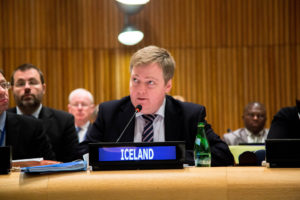Corruption Sparks Regime Change across the Globe
 Recent corruption scandals in South Korea, Brazil, and Iceland demonstrate how corruption affects all forms of government. Though autocracies suffer far more from crooked public officials, democratic leaders and politicians do not always shy away from the allure of bribes from illicit sources. Within democracies, however, the extent of corruption and the public’s response to it varies from country to country. These three examples provide insight into the types of scandals and the range of responses faced by democratic states.
Recent corruption scandals in South Korea, Brazil, and Iceland demonstrate how corruption affects all forms of government. Though autocracies suffer far more from crooked public officials, democratic leaders and politicians do not always shy away from the allure of bribes from illicit sources. Within democracies, however, the extent of corruption and the public’s response to it varies from country to country. These three examples provide insight into the types of scandals and the range of responses faced by democratic states.
In 2014, the world learned that executives in Brazil’s state-run oil company, Petrobras, and members of the Brazilian congress laundered $5.3 billion from the company in a government-affiliated kick-back scheme. The fallout from this scandal resulted in mass layoffs and exacerbated Brazil’s economic turmoil. The political fallout landed in large part on the president at the time, Dilma Rousseff. Though never officially tied to the scandal, she chaired Petrobras’s board from 2003-2010, during which much of the theft occurred. As a result of public outcry and a large effort by opposition parties, the Brazilian congress impeached Rousseff at the end of August 2016, with the support of over half of the population. Despite evidence of wrongdoing, however, a sizable group of Brazilians--one third of the population--did not wish to see her impeached. In addition, some evidence suggests that much of the support for her impeachment developed as a result of her incredibly poor economic record. Finally, supporters of Rousseff have levied charges of hypocrisy, given the fact that around 60 percent of Brazil’s congress faces investigation on charges ranging from bribery to homicide. Unsurprisingly, some on the left have compared the events in Brazil to a political coup.
Compared to South Korea, in fact, the Brazilian public seems more willing to forgive politicians or ignore their infractions. The scandal that would eventually lead to the impeachment of South Korean President Park Geun-hye began soon after the assassination of her father in 1979, when Park befriended Choi Soon-sil. After Park won the presidency, Choi began to exert a significant influence over her decisions, ranging from matters of state to wardrobe choices and even spiritual advising. In addition, evidence mounted suggesting that Choi benefited financially from her relationship with Park. When the South Korean public learned of this information, outrage ensued. Mass protests erupted and public opinion sharply turned against President Park. Before the Korean parliament voted to officially impeach her, over 75 percent of the Korean public supported her impeachment, despite an economy showing moderate growth and a positive outlook.
Yet even this relatively rapid turnaround took place over the course of almost three months. In Iceland, anger over a corruption scandal resulted in the removal of Prime Minister Gunnlaugsson in all of two days. The scandal began after the release of the Panama Papers on April 3, 2016. The papers, released by Mossack Fonseca, a law firm, provided a glimpse into the owners and operators of offshore tax shelters, revealing connections between world leaders and tax havens. One such connection revealed the Gunnlaugssons’ money-sheltering habits: he used to own an offshore investment company, which his wife still owns, that held considerable claims on Icelandic banks that failed in the 2008 economic crisis. This discovery led to mass protests on the streets of Reykjavik, the Icelandic capital, and by April 5, the Prime Minister had stepped aside--though not officially resigned--in favor of another minister. All of this occurred despite an economic boom that some observers have described as miraculous.
These examples all eventually led to the same result: the removal of a leader. Yet the differences in swiftness and public support, as well as the severity of each offense, provide a glimpse into the political culture of each nation. Brazil, with significant public opposition to impeachment and the notable effects of an economic crisis on presidential support, seems far more tolerant to political misbehavior than Iceland, where a strong economy did nothing to protect a prime minister from a public angered by corruption. Such instances reveal that, in the end, a country’s cultural response to corruption stems from differences in social history and its relationship with, and expectations of, authority. Ultimately, a tacit acceptance of corruption can cause an isolated issue to become systemic and lead to democratic erosion.
